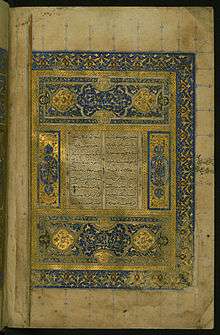Sufi poetry
Sufi poetry (Persian: شعر صوفی) has been written primarily in Persian, both for private devotional reading and as lyrics for music played during worship, or dhikr.

| Part of a series on Islam Sufism |
|---|
|
List of sufis |
|
|
Themes and styles established in Punjabi poetry, Sindhi poetry, Arabic poetry and mostly Persian poetry have had an enormous influence on Sufi poetry throughout the Islamic world, and is often part of Sufi music. In Punjab, Sindh and other provinces of Pakistan and India Sufi poetry played a singular role in maintaining communal harmony in turbulent times. Sufi poetry in most of the regional languages and vernaculars of India, by the nobility of its pious feelings and rhythmic rendition, has inspired the people to seek the Love Divine. The friendly and tolerant utterances of the Sufis retained the favour of the Hindus as well as the Muslims and influenced the people's thought and sent a message of peace, love, fellowship, understanding and amity. Sufi poetry has bestowed a remarkable legacy of communal harmony for posterity.
Themes
The Sufi conception of love was introduced first by Rabia of Basra, a female mystic from the 8th century. Throughout Rumi's work the "death" and "love" appear as the dual aspects of Rumi's conception of self-knowledge. Love is understood to be "all-consuming" in the sense that it encompasses the whole personality of the lover. The influence of this tradition in Sufism was likely drawn from Persian or Hindu sources; no comparable idea is known from 9th century Christianity or Judaism. In a literary wordplay Fakhreddin Eraqi changed the words of the shahada (la ilaha illa'llah) to la ilaha illa'l-'ishq ("there is no deity save Love"). For his part, Rumi, in his writings, developed the concept of love as a direct manifestation of the will of God, in part as a calculated response to objections coming from the orthodox wing of Islam: "Not a single lover would seek union if the beloved were not seeking it".[1]
The concepts of unity and oneness of mankind also appear in Rumi's works. For example, the poem "Who Am I?"[2] implies that human beings are all creatures of God regardless of what religion or land they belong to. So as to contemplate beyond physical being, God has privileged mankind by blessing him with the soul, which helps him understand the concepts of love, affection, sacrifice, etc. Hence, the human soul is placeless and traceless. It exists somewhere beyond the mundane world, so the body carrying the soul should also nurture it in a way that brings it closer to the ultimate Beloved. This may be achieved if all human beings consider themselves as members of an organic whole.
Notable work
- The Mathnawī and Diwan-e Shams-e Tabriz-i of Rūmī
- Dīwān of Hāfez by Hafiz Shirazi
- Fuṣūṣ-ul-Ḥikam ("The Bezels of Wisdom") and Tarjumān al-Ashwāq ("The Interpreter of Desires") by Ibn Arabi
- Kimiya-yi sa'ādat ("The Alchemy of Happiness") by Al-Ghazali
- The Conference of the Birds by Farid al-Din Attar
- The Dīwān of Yūnūs by Yunus Emre
- The Qaṣīdat-ul-Burda ("Poem of the Mantle") of al-Buṣīrī
- Asrār-ut-Tawḥīd ("The Secrets of Unity") by Shaikh Abū Sa`īd Abū-l-Khair
- al-Fatḥ al-mubīn fī madḥ al-amīn ("Clear Inspiration, on Praise of the Trusted One") by ʿĀ’ishah bint Yūsuf al-Bāʿūniyyah
- Diwan-e-Akhtar by Hazrat Hakim Akhtar
- Dala’il al-Barakat by Muhammad Tahir ul-Qadri
- Kulliyyat-e-Hasrat by Muhammad Abdul Qadeer Siddiqi Qadri 'Hasrat'
- Lataife Ashrafi by Ashraf Jahangir Semnani
- Tassawwuff by Syed Waheed Ashraf
- The poems of Sultan Bahu
See also
References
- Milani, Milad. Sufism in the Secret History of Persia. Routledge (2013), 36.
- Aminrazavi, Mehdi (2015). Sufism and american literary masters. State Univ Of New York Pr. ISBN 1438453523. OCLC 908701099.
Further reading
- Chopra, R. M. (1999). Great Sufi Poets of The Punjab. Iran Society, Calcutta.
- Chopra, R. M. (2016). Sufism (Origin, growth, eclipse, resurgence). Anuradha Prakashan, New Delhi. ISBN 978-93-85083-52-5.
External links
- Pakistan Best Sufi Rang
